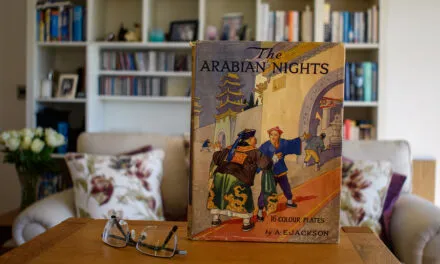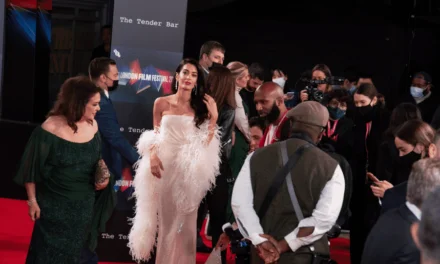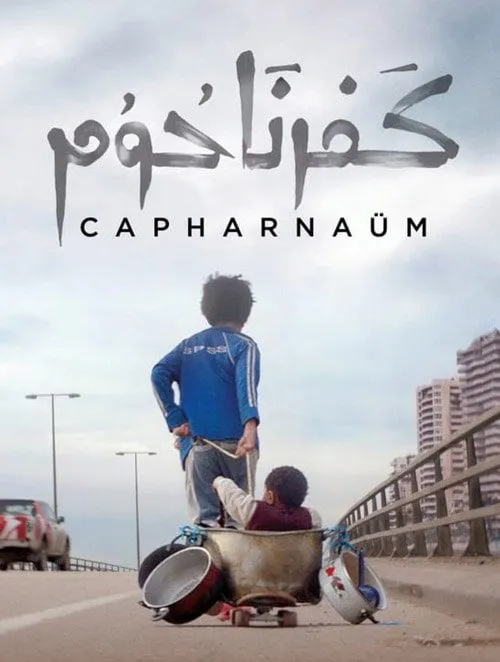From A Homeless Child’s Perspective
In ‘Capernaum,’ The Chaos Of Lebanon From A Homeless Child’s Perspective
December 16, 20188:03 AM ET 6:06
The Intreview
LULU GARCIA-NAVARRO, HOST:
OK. This is the time of year when film critics announce their best of lists. Among the Hollywood titles, there is one film from the Middle East that reviewers are praising. It’s called “Capernaum,” and it’s already won the Jury Prize at this year’s Cannes Film Festival. It tells the story of homeless children in Beirut, Lebanon. And it opens in the United States this week. NPR’s Bilal Qureshi reports.
- BILAL QURESHI, BYLINE: In one of the first scenes in “Capernaum,” the camera flies above Beirut’s slums.
(SOUNDBITE OF MUSIC) - QURESHI: The images on screen are a reflection of Beirut as it is today – a condition captured in the film’s title.
- NADINE LABAKI: Capernaum in French is used usually in French literature to signify chaos, to signify hell, disorder.
- QURESHI: That’s Lebanese filmmaker Nadine Labaki. In recent years, Lebanon has taken in more than a million refugees fleeing the war in neighboring Syria. Labaki says the sight of hundreds of children begging on the streets has become the new normal. And she remembers the night she decided she had to do something.
- LABAKI: I was coming back from a party at 1 o’clock in the morning. And I see a mother with her child begging. He was almost like 2, and he was dozing off. And he couldn’t sleep. And for me, it was this sight of this kid that doesn’t want anything but to sleep. And we were not giving him the right to sleep. And it struck me. Everything that this kid is going to know for the next two, three years is this half a meter sidewalk. It’s his only playground.
- QURESHI: Labaki was pregnant at the time.
- LABAKI: How come we got to that point? How do we allow for such injustice to happen to the most fragile human beings in our society?
- QURESHI: The answers came with years of research, spending time with the families living that reality. Nadine Labaki’s husband Khaled Mouzanar is the film’s producer and composer.
- KHALED MOUZANAR: We spent four years with all these people in the poorest and darkest places of Beirut, where all these people end up after going on the streets of rich neighborhoods where they are beggars. They go back to these places where they live. And it is close to hell.
- QURESHI: His wife says she wanted to show that hell from a child’s point of view, so she interviewed hundreds of kids living on the streets.
- LABAKI: I used to make it a point at the end of the conversation to ask them, are you happy to be alive? And most of the times, the answer was, no. They just see themselves as insects, as parasites. Some of them use those words. I’m just an insect. I don’t exist. I’m invisible. So I wanted to translate this anger.
- QURESHI: And that’s translated on screen in the form of a 12-year-old boy named Zain as he takes the stand in a courtroom.
ZAIN AL RAFEEA: (As Zane, speaking Arabic).
ELIAS KHOURY: (As judge, speaking Arabic).
AL RAFEEA: (As Zane, speaking Arabic)
- QURESHI: He tells the judge he is suing his parents for the crime of bringing him into the world.
- LABAKI: And by suing his parents, he’s also suing a whole system, a whole society that is not allowing him to have his basic rights.
- QURESHI: The film then goes back in time to show how hunger and abuse drove Zain into that courtroom. For most of its running time, “Capernaum” feels more like a documentary. That’s because so much of it is not fiction.
- LABAKI: There’s no extras in the film. You know, we come to a place. We shoot with everything in it – with the people. We shot in the prisons with the prisoners. These are real prisons. The apartments are real apartments. The drawings on the walls are drawings made by kids who lived in these apartments, so the rule was to intervene the least possible in order to be able to tell the truth.
- QURESHI: In one of the film’s most powerful scenes, Zain’s beloved sister is sold into marriage. And as she’s taken away on a motorcycle, the young actor runs after her in tears.
(SOUNDBITE OF CHILDREN CRYING) - LABAKI: He went around the block going after the motorcycle five tours around the block. He wouldn’t stop running, and the cameras would not stop running behind him. Everybody, the whole crew was running behind him because we are at his service. He decided to run, and we ran. And it was the only way for me to achieve what we achieved.
- QURESHI: Nadine Labaki is already one of the most celebrated filmmakers in the Middle East. She says movies were her escape as a child trapped at home during the Lebanese Civil War. Her first film was a lighthearted, feminist comedy called “Caramel.” It was an international hit. “Capernaum” is a departure for the director with an unapologetically activist agenda. But film critic Nana Asfour says it succeeds because it is, first and foremost, a great piece of filmmaking.
- ASFOUR: The cinematography’s great. The editing is fantastic. The acting is incredible – that she coaxed such amazing performances out of these non-actors.
- QURESHI: But “Capernaum” also has its critics. Some reviewers have called it poverty porn – art that exploits the suffering of its subjects for accolades. When I asked her, Nadine Labaki says she doesn’t care.
- LABAKI: When people use the word porn poverty and all that, I don’t even know what it means. But I cannot do anything towards people who just decide to be cynical towards me wanting to tell a story just because I haven’t lived. OK. I haven’t lived their lives. Of course I haven’t lived their lives, but somebody needs to tell that story somehow.
- QURESHI: Nadine Labaki’s film version of that story is two hours long. But as she says, the real story will be playing on the streets of Beirut for generations to come. Bilal Qureshi, NPR News.
(SOUNDBITE OF MUSIC)
BILAL QURESHI
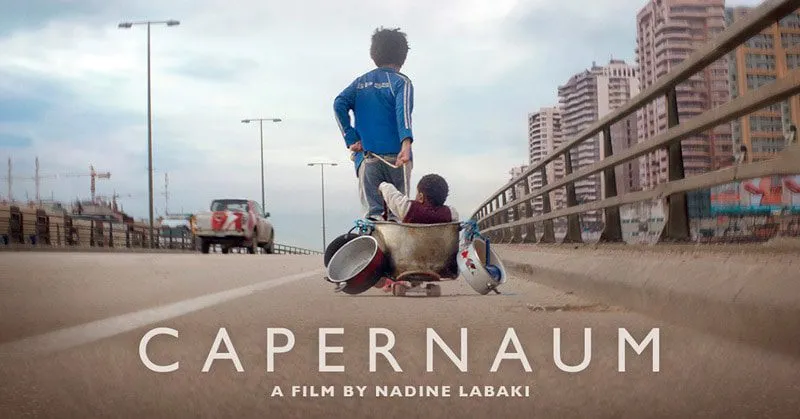
Christopher Aoun/Sony Pictures Classics
There is no sight of the Mediterranean Sea or the glamour of the so-called Paris of the Middle East. This is another side of the Lebanese capital.
“You’re seeing dilapidated buildings, children running around playing with pieces of metals and just whatever they could find on the street, not actual toys,” film critic Nana Asfour said.
A Boy Grows Up Fast On The Streets Of Beirut In The Dickensian ‘Capernaum’
MOVIE REVIEWS
A Boy Grows Up Fast On The Streets Of Beirut In The Dickensian ‘Capernaum’
The Jury Prize winner at this year’s Cannes Film Festival tells the story of Zain, a streetwise 12-year-old, who flees his abusive parents and later sues them for the “crime” of giving him life. It opens in the U.S. this week, days after earning a Golden Globe nomination and a place on many critics’ best-of lists (including NPR’s).
Lebanese filmmaker Nadine Labaki said the dystopian images in her film are a reflection of Beirut as it is today. It’s also captured in the film’s title.
“Capernaum in French is used usually in French literature to signify chaos, to signify hell, disorder,” she said.
In recent years, Lebanon has taken in more than a million refugees fleeing the war in neighboring Syria. Labaki said the sight of hundreds of children begging on the streets has become the new normal. She still remembers the night that she decided she had to do something.
Labaki was pregnant at the time.
“How come we got to that point?” she said. “How do we allow for such injustice to happen to the most fragile human beings in our society?”
In an attempt to find answers, Labaki began working on the film as a reporting project with her husband and collaborator, the film composer and musician Khaled Mouzanar. After it became evident that nobody would initially finance the story, the couple mortgaged their home and set out to bring the story to screen.
“We spent four years with all these people in the poorest and darkest places of Beirut, where all these people end up after going on the streets of rich neighborhoods where they are beggars,” Mouzanar said. “They go back to these places where they live, and it is close to hell.”
Labaki said she always knew she wanted to tell the story from a child’s point of view. So she interviewed hundreds of kids living on the streets.
“I used to make it a point at the end of the conversation to ask them: Are you happy to be alive?” she said. “And most of the times the answer was no. They just see themselves as insects, as parasites — some of them used those words. ‘I’m just an insect. I’m just a parasite. I don’t exist. I’m invisible.’ So I wanted to translate this anger.”
Capernaum shows the hunger, suffering and abuse that drove Zain into a courtroom.
“And by suing his parents he’s also suing a system, a whole society that is not allowing him to have his basic rights,” Labaki said.
“I was one day coming back from a party at 1 o’clock in the morning, and I see a mother with her child begging,” she said. “He was almost, like, 2, and he was dozing off and he couldn’t sleep,” she said. “And we were not giving him the right to sleep. And it struck me: Everything that this kid is going to know for the next two, three years is this half-a-meter sidewalk. It’s his only playground.”
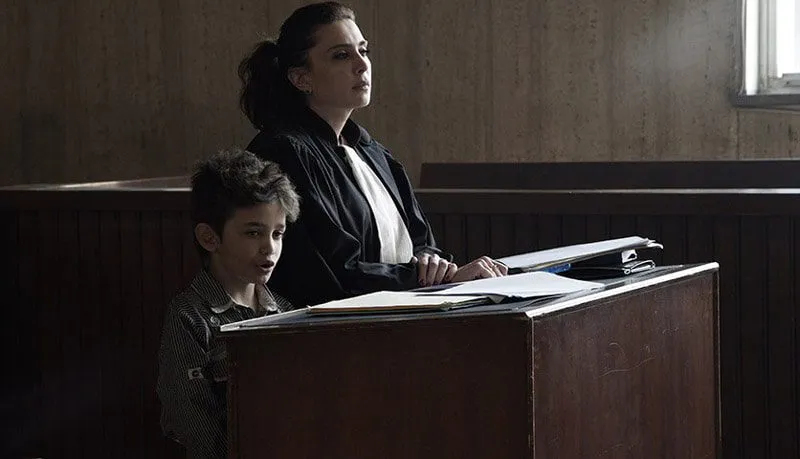
In Capernaum, Zain (Zain Al Rafeea) takes the stand to sue his parents. In a cameo appearance, his lawyer is played by the film’s director, Nadine Labaki.
Fares Sokhon/Sony Pictures Classics
“There’s no extras in the film,” she said. “You know, we come to a place, we shoot with everything in it. With the people, we shot in the prisons with the prisoners — these are real prisons. The apartments are real apartments — the drawings on the walls are drawings made by kids who lived in these apartments. So the rule was to intervene the least possible in order to be able to tell the truth.”
In one of the film’s most powerful scenes, Zain’s beloved sister is being taken away after being sold into marriage. The young actor runs after a motorcycle in tears.
“Five tours around the block, he wouldn’t stop running, and the cameras would not stop running behind him,” Labaki said. “Everybody — the whole crew — was running behind him. Because we are at his service. He decided to run and we ran. And it was the only way for me to achieve what we achieved.”
Before the critical success of Capernaum, Labaki was already one of the most-celebrated filmmakers in the Middle East. She said she fell in love with the movies as a child growing up during the Lebanese civil war.
“We were somehow confined for a very long time behind sand bags and we couldn’t go outside,” she said. “We couldn’t go to school, so boredom was a big part of my life, and I was very lucky because I lived right above a small video store that used to rent VHS tapes, and we used to sneak behind those sandbags to go inside and rent those films over and over again.”
‘Where Do We Go?’ Lebanese Women Pave The Way
MOVIE INTERVIEWS
In Nadine Labaki’s ‘Where Do We Go Now?’ Women Pave The Way
Labaki’s first film, Caramel, was a lighthearted feminist comedy about four women working in a Beirut beauty salon. It was an international hit.
Capernaum is a departure in tone, intensity and style for the filmmaker — and features her most unapologetically activist agenda.
“I want to believe that I am able to make a change, so I decide to use my tool, which is filmmaking, to tell the story of what I was witnessing,” Labaki said.
The film takes on urgent global issues — child poverty and migration among them — but film critic Nana Asfour says it succeeds because it is first and foremost a great piece of cinema.
“The cinematography is great,” she said. “The editing is fantastic. The acting is incredible that she coaxed such amazing performances out of these non-actors.”
Some reviewers have expressed disapproval, calling the movie “poverty porn” – art that exploits the suffering of its subjects for accolades. Labaki said she doesn’t care.
“What do they mean by that?” she said. “But I cannot do anything toward cynicism, you know, toward people who just decide to be cynical toward me wanting to tell the story because I haven’t lived … of course I haven’t lived their lives, but somebody needs to tell that story, somehow.”
Besides, Labaki said, her film is two hours long. The real story will be playing on the streets of Beirut for generations to come.
NEWS/LEBANON
Nadine Labaki’s film Capernaum receives Academy Award nod
Lebanese director Nadine Labaki makes Oscars’ history as first female Arab filmmaker nominated.
23 Jan 2019
MORE ON ARTS & CULTURE
South Korea: Thaw in ties with North boosts ice fishing festival
today
Michael Jackson documentary on child sexual abuse shocks Sundance
yesterday
Inside the sewing rooms of Alaska’s kuspuk designers
yesterday
Why Qatar’s migrant workers dress up on ‘fashion Fridays’
2 days ago
Lebanon has received its second Oscar nomination in as many years with film director Nadine Labaki making history as the first Arab woman to be nominated for the best foreign language film.
Labaki is the only female director among the five nominees and represents Lebanon a year after fellow compatriot Ziad Doueiri’s The Insult was nominated.
Her film, Capernaum, which means chaos, was met with critical acclaim having been previously nominated for the Golden Globe Award for Best Foreign Language Film.
“It’s a national pride,” Labaki told The Associated Press. “Lebanon doesn’t have a real cinema industry in the real sense of the term. With our first nominee last year and this one this year, it’s a big step.
“We have always thought as Lebanese people that unfortunately nothing is possible because we always thought Lebanon is a very small country and we have always felt that we are almost invisible on the map,” she said.
Last year, Labaki also made history for being the first female Arab director to win the Jury Prize at the Cannes Film Festival, a major award in the competition. The premiere screening of Capernaum during the festival received a 15-minute standing ovation.
Set against the backdrop of the Middle East’s growing refugee crisis, the film is about a 12-year-old Lebanese boy who sues his abusive parents in court for the “crime” of giving him life, and follows his struggle living on the streets.
The film featured first-time actor Zain al-Rafeea, a 14-year-old Syrian refugee whose family was displaced from Syria in 2012. Labaki’s husband, Khaled Mouzanar, produced and composed the film.

Nadine Labaki, composer Khaled Mouzanar, and cast member Zain al-Rafeea pose with the Jury Prize award for the film Capernaum at the 71st Cannes Film Festival
[File: Jean-Paul Pelissier/Reuters]
“You just have to believe in your dream,” she said.
Earlier this month, Oprah Winfrey told her 42 million followers on Twitter that Capernaum would be “really worthy of their time”.
“Story of a young boy who sues his parents for having children they can’t take care of – makes you think of all the children for whom this story is a daily reality. Bravo team #Capernaum,” Winfrey wrote.
The 91st Academy Awards ceremony airs on February 25 in Los Angeles.
Capernaum faces stiff competition from Mexican director Alfonso Cuaron’s autobiographical masterpiece Roma, which has been nominated for a total of 10 Oscars.
Five movies about individuals and families confronting social and historical tumult are competing in the Academy Awards’ race, including Capernaum and Roma, along with German director Florian Henckel von Donnersmarck’s artist biopic Never Look Away, Japanese filmmaker Hirokazu Kore-eda’s subtle family story Shoplifters, and Polish filmmaker Pawel Pawlikowski’s 20th-century romance, Cold War.
“[The] other four nominated titles in the category are absolutely amazing and strong, and I’m proud that Shoplifters is selected among them,” Hirokazu said in a statement.
Another Arab director, Syrian Talal Derki, has also been nominated for his film Of Fathers and Sons in the best documentary feature category.






